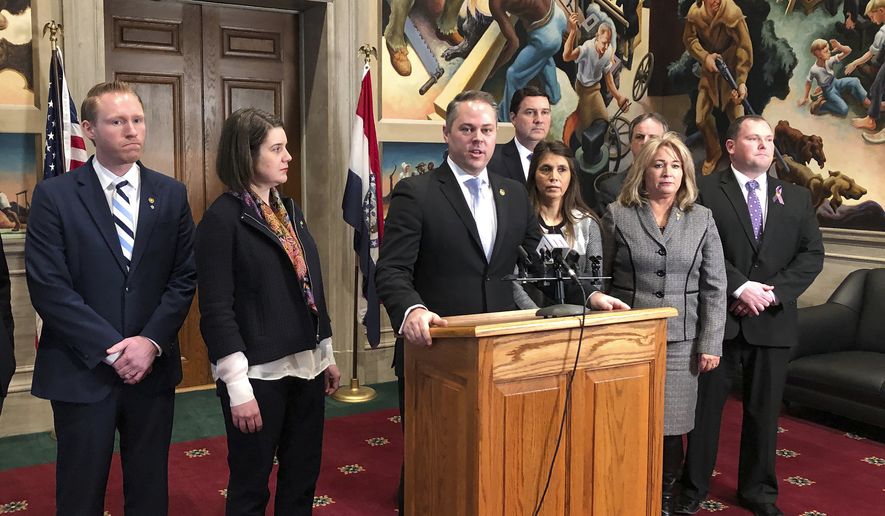Republican-led Missouri legislators on Wednesday approved a bill that would be the most restrictive abortion law in the country, in response to recent measures in East Coast states that would allow late-term procedures, the speaker of the Missouri House of Representatives said.
“We watched what happened to New York and Virginia, and it was somewhat of a call to action,” Missouri House Speaker Elijah Haahr told The Washington Times in a telephone interview. “The goal of this underlying bill is to protect the unborn in this state.”
Missouri joins a growing roster of Republican-led legislatures seeking more stringent laws that perhaps could trigger a challenge to the U.S. Supreme Court’s 1973 Roe v Wade decision that established a national right to abortion. Pro-life advocates have hailed President Trump’s appointment of conservative justices to the court, saying it offers them a good chance of seeing the 46-year-old ruling overturned.
Mr. Haahr, a Republican representing a district in southwest Missouri, said lawmakers looked at what other states have proposed to limit abortion and decided to bundle all those measures into one piece of legislation on Tuesday. He also studied abortion laws that the U.S. Court of Appeals for the 8th Circuit had struck down because they were not explicit about the state’s interest in protecting life, he said.
“We take and show [in House Bill 126] a significant amount of legislative findings, which multiple attorneys have told us is where other state abortion laws are falling short,” said Mr. Haahr, an attorney himself.
The Missouri House approved the legislation in a 117-39 vote Wednesday, sending it to the Senate.
House Bill 126 combines nearly every abortion restriction that lawmakers have proposed in recent years. It would ban the procedure when a fetal heartbeat can be detected (typically after six weeks of pregnancy), when a fetus can feel pain (generally around 20 weeks) and for selective reasons involving the fetus’ race, gender or diagnosis of Down syndrome. The bill also would require both parents to be notified before a minor receives an abortion.
Declaring that “God is the author of life,” the legislation cites a state law that establishes brain activity as a sign of life to ban abortion if brainwaves are detected (generally at eight weeks). And it includes a so-called “trigger clause” that automatically would ban all abortions, except for in medical emergencies, if the Supreme Court overturns Roe v Wade.
“This is the strongest piece of pro-life legislation in our nation,” state Rep. Nick Schroer said during a press conference after the bill was approved.
Mr. Schroer, a Republican, introduced the original fetal-pain bill from which the approved legislation grew. He said the legislation has been designed so that if a judge overturns one provision, another can take its place.
“Let’s say [a judge overturns our ban after] eight weeks, then it moves to 14 weeks,” Mr. Schroer said.
“This is a cutting-edge fetal pain bill,” said Sue Swayze, state director of the pro-life Susan B. Anthony List. “It’s an unborn baby’s dream bill.”
Missouri’s legislative session ends in mid-May, and Mr. Haahr said he expects Republican Gov. Mike Parson will sign the pro-life bill.
“I’m honored to lead a state with so many people committed to standing up for those without a voice,” Mr. Parson said in a statement issued late Tuesday. “I applaud the bipartisan efforts of the Missouri House of Representatives for choosing to take a bold stand to protect women’s health and the right to life.”
Some Democrats have backed the legislation, but not all.
“Missouri Republicans should quit playing politics with women’s lives and instead focus on healthcare policies that move our state forward,” Missouri Democratic Party Executive Director Lauren Gepford said in a statement. “Missouri Democrats believe that women have a constitutional right to make their own healthcare decisions. Period.”
Meanwhile, a spokeswoman for Planned Parenthood Advocates in Missouri said they anticipate a court challenge if the bill becomes law.
“Reproductive health care is health care,” said M’Evie Mead, policy director of the Missouri organization. “Those attempting to restrict access to women’s healthcare must be called out for their real intention, running in a political race to be the state that overturns Roe v Wade at the Supreme Court.”
Still, Arkansas, Louisiana, Mississippi, North Dakota and South Dakota have enacted abortion bans that would be triggered if Roe v. Wade is overturned.
And several states such as Florida, Kentucky, Ohio, South Carolina and Tennessee are considering fetal heartbeat restrictions.
Some progressive legislatures have begun to doubt that constitutional support will always be there for abortion and have moved to enshrine the procedure in their states’ laws. States from Rhode Island to Virginia have introduced bills to undergird abortion protections in the event of Roe v. Wade being overturned. New York this year enacted a law that allows late-term abortion if a mother’s health is at risk.
Such legislation has piqued pro-life states, where opponents see the bills as tantamount to the termination of infants.
“Missouri is not New York or Virginia” Mr. Haahr tweeted upon announcing the bill’s introduction last month.
Republican state Rep. Mike Moon called abortion “the holocaust” of modern society in the House’s four-hour floor debate on the bill Wednesday.
Opinion polls consistently have shown that most Americans support access to abortion in the first trimester (the first 12 weeks) but that support drops significantly further along into pregnancy.
On Monday, the U.S. Senate blocked a bill that would insist that medical care be provided for babies born alive after an attempted abortion.
Democrats who opposed the bill said the vote was a political stunt following comments by Virginia Gov. Ralph Northam in a radio interview that some have suggested shows he supports allowing doctors to kill babies who survive botched abortions. His office has denied that characterization.
• Christopher Vondracek can be reached at cvondracek@washingtontimes.com.




Please read our comment policy before commenting.